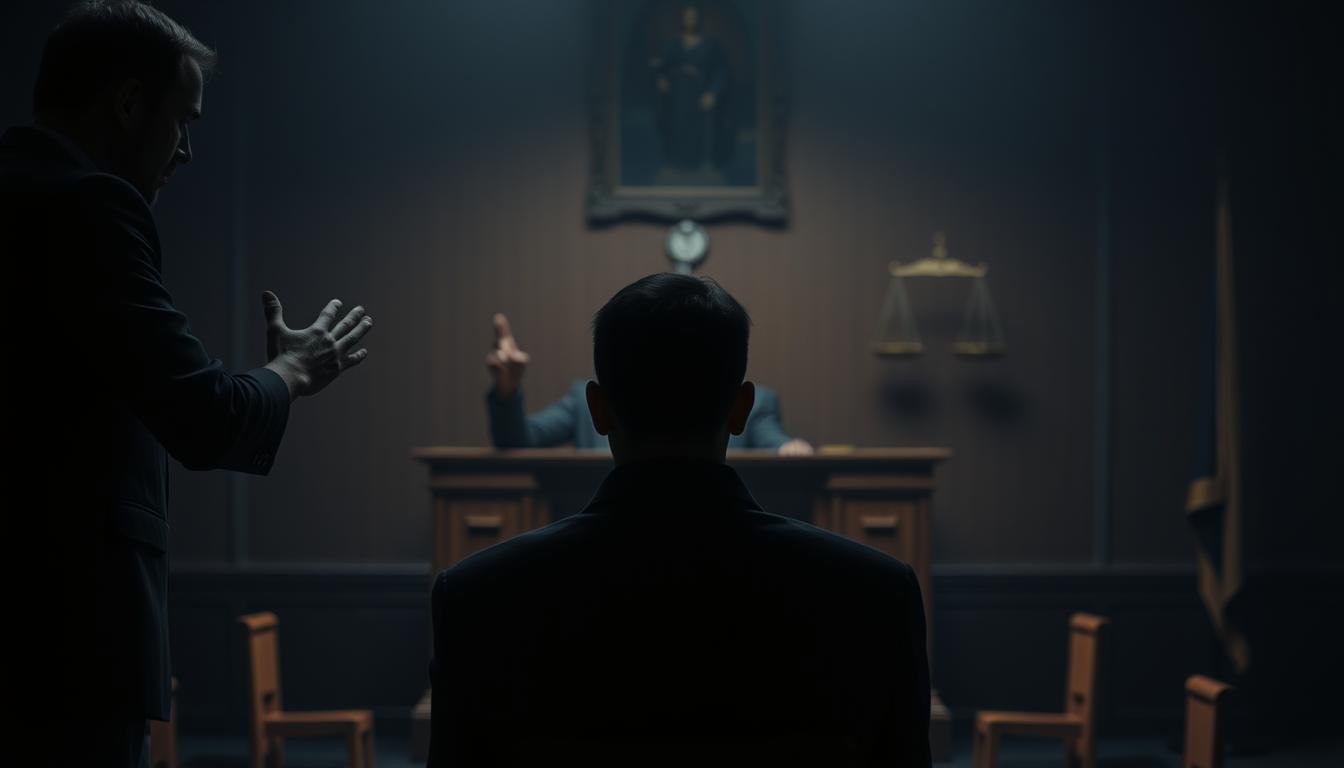Did you know that approximately 80% of criminal defendants in the United States rely on public defenders or private criminal defense attorneys for their cases? This staggering statistic underscores the critical role defense lawyers play in our legal system. These dedicated professionals ensure the accused receive fair representation and protection under the law. As advocates for their clients, criminal defense attorneys navigate the complex landscape of the criminal justice system, striving to secure the best possible outcomes in legal matters.
Understanding the depth of their responsibilities helps us appreciate the significance of a criminal defense attorney in our society. Whether working on high-profile cases or helping individuals facing minor charges, these lawyers are vital in upholding justice and protecting rights. To explore more about this pivotal profession, visit The Role of a Criminal Defense.
Key Takeaways about The Role of a Criminal Defense Lawyer :
- The majority of defendants depend on criminal defense lawyers for representation.
- Defense attorneys ensure fair trials by advocating for clients’ rights.
- They navigate the complexities of the criminal justice system effectively.
- Criminal defense lawyers significantly impact the outcomes of legal cases.
- Understanding their role helps appreciate the justice system’s functioning.
Understanding Criminal Defense Law
Criminal defense law is the bedrock for safeguarding the rights of those accused of crimes. The definition of criminal defense spans multiple legal facets, ensuring defendants receive fair treatment. This includes grasping legal standards and the spectrum of offenses. Such knowledge illuminates the pivotal role criminal defense attorneys have in navigating the legal labyrinth.
Definition and Scope
The realm of criminal defense law encompasses a broad spectrum of crimes, from minor misdemeanors to grave felonies. It focuses on the rights of the accused, due process, and the prosecution’s burden of proof. Crucial aspects of criminal defense include procedural safeguards, such as the right to silence and legal counsel. These rights are vital for upholding justice within the legal system.
Key Principles of Criminal Defense
Grasping the principles of criminal defense is crucial for both legal professionals and clients. Core principles include the presumption of innocence, where an individual is deemed innocent until proven guilty. The right to a fair trial guarantees a just process within the judicial system. Criminal defense lawyers employ these principles to advocate for their clients, upholding legal standards. For further insights into a criminal defense attorney’s duties, visit this link.
Functions of a Criminal Defense Lawyer
The role of a criminal defense lawyer is multifaceted, aimed at ensuring fair legal representation for their clients. These legal professionals navigate the complexities of the legal system, performing essential functions. Understanding these roles sheds light on how they advocate for their clients’ interests.
Legal Representation in Court
In court proceedings, skilled legal representation is paramount. Defense lawyers present evidence, cross-examine witnesses, and articulate legal arguments. This highlights the critical role of advocacy in the judicial process.
Negotiating Plea Deals
Negotiating plea deals is another crucial duty of defense lawyers. They engage with prosecutors to seek outcomes that may reduce charges or penalties. Grasping the nuances of these negotiations is vital for an effective legal strategy.
Advising Clients on Legal Rights
Defense lawyers also advise clients on their legal rights throughout the legal process. Keeping clients informed fosters trust and empowers them to make informed decisions. This support ensures clients feel secure and knowledgeable about their options.
Importance of a Criminal Defense Lawyer
Criminal defense lawyers are pivotal in the justice system, acting as champions for those accused. Their specialized knowledge ensures fair legal treatment. Understanding their role reveals how they safeguard rights in court, shaping case outcomes.
Protecting Client Rights
Protecting client rights is a primary duty for criminal defense lawyers. They ensure clients grasp their legal rights and options at each case stage. Defense attorneys address rights violations, like unlawful searches or coerced confessions. Their advocacy creates a fair legal environment, essential for justice.
Impact on Case Outcomes
The value of skilled legal representation in case outcomes is immense. Studies show that a defense lawyer boosts the chance of favorable results, like reduced charges or sentences. Lawyers adept in navigating legal complexities influence prosecution strategies. Their expertise often aligns client interests with the judicial system.
In conclusion, defense lawyers’ role in safeguarding rights and shaping case outcomes is crucial. Their advocacy ensures justice is accessible to all. For those facing legal challenges, seeking a criminal defense lawyer is a vital step. Learn more about enhancing your legal strategy to protect your rights in complex situations by visiting this resource.
The Criminal Justice Process
The criminal justice system is a complex series of stages, aimed at ensuring a fair trial and safeguarding the rights of the accused. From the moment of arrest to the final sentencing, each step is outlined by specific criminal procedures. These procedures reveal the crucial role a defense lawyer plays at every stage, guiding their clients through the labyrinth of legal complexities.
Overview of Criminal Procedures
The journey through criminal procedures starts with an arrest, where law enforcement detains a suspect based on probable cause. The individual then faces initial court appearances, where charges are formally laid. These procedures encompass several key elements:
- Arrest
- Arraignment
- Pre-trial motions and hearings
- Trial
- Sentencing
- Appeals
The Role of Defense in Each Stage
Defense lawyers play a pivotal role at every stage of the criminal justice system:
| Stage | Defense Role |
|---|---|
| Arrest | Advising clients of their rights and ensuring proper procedural adherence. |
| Arraignment | Representing clients to enter a plea and explaining potential outcomes. |
| Pre-trial | Filing motions to suppress evidence and negotiating plea deals. |
| Trial | Presenting evidence, cross-examining witnesses, and arguing for acquittal. |
| Sentencing | Advocating for leniency and exploring alternative sentencing options. |
| Appeals | Evaluating trial court decisions and filing appeals where necessary. |
Challenges Faced by Criminal Defense Lawyers
Criminal defense lawyers face numerous challenges that test their professional and personal limits. They navigate a complex landscape filled with ethical dilemmas. These dilemmas require careful consideration, balancing client confidentiality with the legal duty to uncover the truth. Such decisions can significantly impact their cases and clients’ lives.
Ethical Dilemmas
One of the most significant ethical dilemmas defense lawyers face is balancing client obligations with broader societal interests. They must navigate situations where they suspect their clients might be guilty yet still ensure a fair trial. This challenge demands integrity, upholding the law while possibly confronting conflicting morals.
Emotional Toll of Defense Work
The emotional toll of defending clients in serious criminal cases is immense. Lawyers are deeply affected by the circumstances of their clients, often in cases involving violence or severe consequences. This emotional burden can impact their mental health and overall well-being. Understanding this toll is crucial for those considering a career in this field.
Navigating Complex Cases
Navigating complex cases is another significant challenge for defense lawyers. These cases require extensive research, analysis, and a deep understanding of legal frameworks. Lawyers must synthesize large amounts of information and strategize effectively. The legal environment’s continuous evolution makes staying current with new laws and precedents an ongoing challenge.
Skills Required for Criminal Defense Lawyers
Criminal defense lawyers are pivotal in safeguarding their clients’ rights. They must possess a range of complex skills to excel. Key among these are strong communication, analytical thinking, and negotiation prowess. These abilities are fundamental to their success.
Strong Communication Abilities
Effective communication is paramount for defense lawyers. They must articulate legal arguments with clarity and confidence in court. It’s essential to convey complex legal concepts in a manner accessible to clients and jurors. Utilizing appropriate legal terminology is also crucial for engaging with various stakeholders.
Analytical Thinking and Problem Solving
Analytical thinking is essential for crafting solid defense strategies. Lawyers must sift through extensive information, identifying patterns and inconsistencies in evidence. This skill enables them to pinpoint weaknesses in the prosecution’s case, facilitating more effective problem-solving during trials.
Negotiation Skills
Negotiation skills are another critical competency. Many criminal cases are resolved through plea deals outside the courtroom. A proficient defense lawyer must negotiate advantageous terms for their clients. They need to understand the legal framework and the implications of different options.
Common Misconceptions
Many misconceptions about defense lawyers persist, often clouding public understanding of their essential role in the legal system. A prevalent belief is that defense attorneys support or enable clients’ guilt. This misconception creates a false narrative about the nature of justice and the principle of guilt vs. innocence. In reality, defense lawyers serve as advocates for their clients, working diligently to ensure a fair trial, irrespective of the allegations against them.
Criminal Defense Lawyers and Guilt
It is essential to distinguish between a lawyer’s duty to their client and the client’s alleged actions. Defense attorneys do not decide guilt; rather, they ensure that the legal rights of the accused are protected throughout the legal process. This vital function supports the foundation of a just society, where every individual is entitled to an adequate defense, regardless of the circumstances.
The Reality of Legal Fees
Another common misconception about defense lawyers revolves around the nature of legal fees. Many believe these fees are exorbitant and unjustified. In truth, legal fees reflect the complexity of the legal work involved and the expertise required to navigate the system effectively. Defense attorneys may use various billing structures, including flat fees, hourly rates, or payment plans, to accommodate clients from different financial backgrounds. Understanding these structures sheds light on the value of legal services and the importance of investing in experienced representation.
The Role of Research in Defense
Effective criminal defense heavily relies on research in criminal defense. Attorneys must conduct extensive evidence investigation to construct a robust case. This entails obtaining physical evidence, scrutinizing police reports, and consulting with experts. Such meticulous research can profoundly influence a case’s outcome.
Investigating Evidence
Investigating evidence is crucial for building a strong defense. Attorneys examine various evidence types, such as forensic data, surveillance footage, and digital records. Each piece offers vital context. For example, physical evidence might challenge witness statements, revealing discrepancies. By thoroughly examining and presenting this evidence, defense lawyers strengthen their argument and support their client’s case.
Gathering Witness Statements
Witness statements are a key element of a solid defense strategy. Collecting credible eyewitness accounts can significantly impact a case. Defense lawyers must interview witnesses with precision, ensuring their testimonies are clear and pertinent. Often, a single witness’s statement can drastically alter a case’s perspective. Legal professionals may employ strategies from effective literature reviews to improve their witness statement gathering techniques.
Building a Defense Strategy

Creating a successful defense strategy is paramount for any criminal defense lawyer. This journey starts with a comprehensive case assessment. It allows the lawyer to pinpoint the case’s strengths and weaknesses. Each case comes with its own set of challenges, necessitating a strategy that’s uniquely tailored to the client’s situation. Through meticulous analysis, attorneys lay the groundwork for effective representation.
Assessing the Case about The Role of a Criminal Defense Lawyer :
Effective defense strategies are rooted in a detailed case assessment. This entails examining all available evidence, identifying crucial witnesses, and scrutinizing police reports. By grasping the case’s subtleties, the lawyer uncovers potential defenses. This foundational work is crucial in crafting a strategy that targets the specific allegations while exploiting weaknesses in the prosecution’s case.
Tailoring Defense Approaches
Following a thorough assessment, the next phase involves tailoring approaches to the case’s unique aspects. Different scenarios may necessitate various tactics, such as negotiating plea deals or mounting an aggressive defense at trial. A lawyer must continually adapt their strategy, considering new evidence or shifts in the legal environment. This adaptive approach significantly boosts the chances of securing favorable outcomes for clients.
The Impact of Public Opinion
The convergence of public opinion and the legal system forms a complex dynamic. Legal professionals face the challenge of navigating societal influences on jury verdicts. These influences can distort the perception of justice in trials. It is crucial to grasp the implications of public attitudes in courtroom settings.
Influence on Jury Decisions
Public opinion significantly shapes jury verdicts. Jurors, expected to render unbiased judgments, are often influenced by societal beliefs. Media coverage, in particular, can exacerbate this issue. Jurors may feel compelled to conform to the prevailing narrative, compromising their ability to assess evidence impartially.
Media Coverage and Legal Outcomes
Media coverage profoundly impacts public perception of legal cases. Sensationalized or one-sided reporting can create a skewed public opinion. This can undermine the integrity of jury decisions. Recognizing this effect underscores the need to manage media narratives to uphold justice.
Notable Criminal Defense Cases
History is replete with criminal defense cases that have garnered widespread attention, significantly altering legal standards. These high-profile defenses offer profound insights into the art of advocacy, demonstrating how adept lawyers maneuver through intricate scenarios to secure favorable verdicts for their clients. The narratives behind these cases expose the complex dynamics of defense strategies, underscoring the pivotal role of meticulous preparation and profound legal acumen.
High-Profile Defenses
High-profile defenses have a profound impact on the legal system, influencing public perceptions of justice and legal representation. The O.J. Simpson trial and the recent Derek Chauvin case have ignited intense debates on race, law enforcement, and societal norms. These cases highlight the emotional public narrative’s influence and the imperative for innovative legal strategies.
Lessons Learned from Landmark Cases
Examining landmark cases provides invaluable lessons for legal professionals, past and present. These cases reveal patterns of success, illustrating the importance of thorough evidence analysis and strategic witness interviews in achieving justice. Resources such as understanding the roles of defense lawyers bridge knowledge gaps, enhancing awareness of best practices. This benefits advocates and their clients, fostering a more informed and effective legal community.
Resources for Finding a Criminal Defense Lawyer

Securing the right legal counsel can dramatically alter the trajectory of a criminal case. For those confronting legal hurdles, identifying a proficient criminal defense attorney is paramount. Several avenues exist to aid in this quest, including legal aid organizations and referral services. These entities provide indispensable support, crucial for those daunted by the legal system’s complexities.
Legal Aid Organizations
Legal aid organizations are pivotal for individuals unable to afford legal representation’s exorbitant costs. These non-profit entities span various regions, ensuring justice’s accessibility to all. They offer a range of services, including:
- Free or low-cost legal consultations
- Representation in court
- Assistance with legal document preparation
In many areas, legal aid offices specialize in criminal defense, serving as a lifeline for those in need of legal guidance.
Referral Services
Referral services are another effective means to locate a defense attorney. They connect clients with seasoned attorneys specializing in criminal defense. These services boast a network of qualified lawyers, ensuring clients receive adept legal counsel. The advantages of referral services include:
- Access to a curated list of attorneys
- Guidance in selecting the most suitable lawyer
- Insights into potential fees and payment structures
Referral services empower clients to make informed choices, ensuring they engage a lawyer who aligns with their specific needs.
The Future of Criminal Defense Law
The horizon of criminal defense law is set for a profound metamorphosis. Emerging trends in legal practice, mirroring broader societal shifts, are redefining the field. A pivotal trend is the increasing focus on social justice and reform efforts. These movements prompt defense attorneys to scrutinize systemic injustices within the criminal justice system. This endeavor seeks to safeguard individual rights while striving for a more equitable legal framework.
Trends in Legal Practice
Emerging legal practice trends herald a paradigm shift towards a more comprehensive defense strategy. Lawyers are increasingly integrating legal and social considerations into their defense tactics. This evolution is driven by evolving public sentiment, prompting attorneys to align their strategies with justice and equity. Such alignment resonates with a populace that is more aware and engaged than ever before.
Technology’s Role in Defense Strategy
Advances in technology are transforming the defense strategy landscape. Innovations such as artificial intelligence and digital evidence management systems empower defense attorneys to process and analyze extensive data rapidly. These tools significantly bolster the defense’s capacity to build robust cases. They also facilitate more precise and tailored legal representation in the digital era. As we integrate these technological breakthroughs, the future of criminal defense will be characterized by a fusion of innovative legal strategies and advanced technology, ensuring effective defense strategies.

